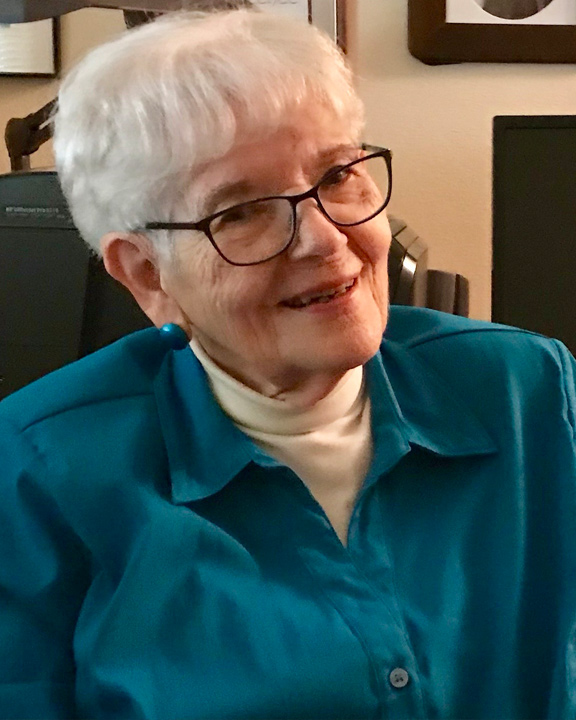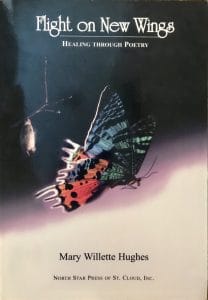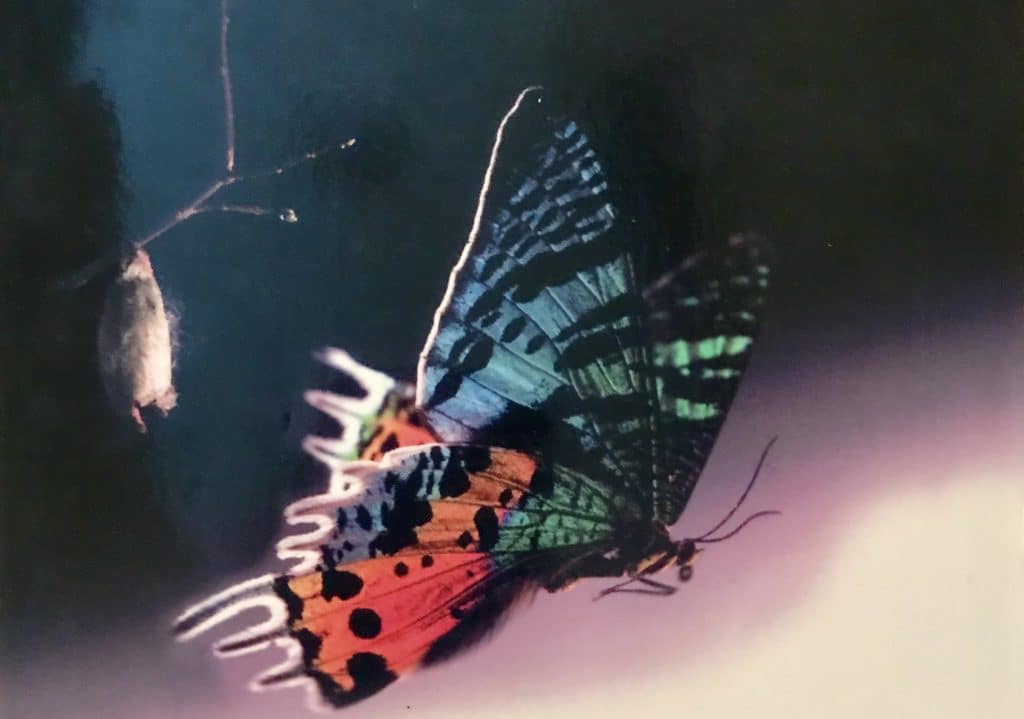Prism colors shimmer, shine.
Web and sun and dew
evolve a new design.
Mary Willette Hughes, from the poem “Design”
On a bright morning in early December, 2019, I visited with Mary Willette Hughes at her Waite Park home. We had come together to talk poetry. She greeted me at her front door with a warm smile and invited me in. I was enveloped by strains of Classical MPR 90.1, which, she told me, she and her husband Mark listen to every day. The living room was pleasantly warm and bright, the house was filled with rainbows cast by the prisms hanging in every window, and my body and soul were flooded with calm. I had crossed a threshold from the busy, demanding world into a place of peace.
Peace, I have learned from wise people, is like a poem, a made thing.
It is now March, 2020. Here in central Minnesota, talk of the presidential primary election and the Corona virus fill the air with anxious grousing. But my office is filled with rainbows. After visiting with Mary in December, I came home and hung a prism—a rainbow maker—in my window. It serves to remind me that small decisions contribute to the beauty of peace.
The making of peace is our choice. We will either participate in turning the world more beautiful and more kind, or we won’t.
For Mary, making poems has had a lot to do with making peace. Family crisis was the starting point. One of her seven children was deeply troubled. Throughout his childhood and into adulthood, he reeled and raged from the trauma of sexual abuse committed against him by a church leader. After years of witnessing his acting out and feeling helpless to change anything, shortly after a particularly disturbing, middle-of-the-night episode that involved screaming and crying, while Mary was on vacation up north, she took her laundry to the laundromat. Sitting there with nothing to do, she thought, “Well. I’m going to write.”

The chaos and confusion were churning, she said, but out of it came a poem. Inspired by memories and reflection, made from words and lines, surrounded by silence, steeped in faith, hope, and love, more poems came. It was a healing process, a path toward peace.
Soon, she was sharing her healing practice of poetry with others. For 19 years, Mary facilitated poetry therapy in the St. Cloud area. She began at St. Cloud hospital, moved to Recovery Plus, and then went to Journey Home. She has over 6,0000 evaluation sheets from people who participated in her workshops. Over 94% of them reported that their experience was “favorable.”
Two of Mary’s sons have 38 and 35 years of recovery, a great blessing for their family. She described writing poetry as a process of moving from guilt and grief into a place of compassion, forgiveness and peace. Writing a poem is a way for people to get away from an overwhelming focus on a traumatic event, when “you’re just carried on a tide, out into this thing that you can’t control,” she said.
When Mary thinks back to her own traumatic experiences, she recognizes she was really not herself. “I was going through the motions of being a housekeeper and baker and all that, but my mind was racing 100 miles an hour. And that’s not good, not to be in touch with yourself and your values and how you look at things.”
To do something, she said, makes us feel more in control of a situation. Doing something might mean making a pan of brownies, or you might make a poem. Any act of creation is helpful, but the work of making a poem, especially during the process of revision, is transformational. In revising a poem, you take what you have on paper and rearrange it, tweak it, explore it, refine it, and make it better—more coherent, more satisfying, more pleasurable.
“The progression is to me amazing,” Mary said. “It’s kind of a miracle, in a way, how the poem ends up from where I started.”
She starts, she said, with a metaphor, or an image that catches her attention, something she wants to explore. Then she writes. “But the place from where I start and where that poem ends up can be an ocean apart.”
In her poem “Design,” for example, she begins with a spider’s web and ends up with an acceptance of imperfection and faith in the processes of transformation.
DESIGN
Mary Willette Hughes
Outside the hospital window
a spider’s web is hung, spun
against the dazzle of sun.
The web is flawed, its pattern
imperfect, yet perfect drops
of morning dew cling
to tensile threads like tears
and refract eastern sunlight
within each pristine drop.
Prism colors shimmer, shine.
Web and sun and dew
evolve a new design.
In “From the Depths,” Mary begins with gnarled guilt and incrimination, comparing her soul to a wounded bird in flight. Then step by step, her poem carries us out of that dark place, into the embrace of “peace, like spring rain.”
FROM THE DEPTHS
guilt and grace
Mary Willette Hughes
Gnarled guilt twists my soul
like a wounded bird in flight.
I hear righteous voices clamor
in a chorus of dissonant song,
harping sharp on north wind,
my own voice, loudest of all.
Sorrow and I flail against air,
wings heavy and pain-weary;
deep is my wound, yet I hear
an inner voice whisper, come,
settle softly here. Rest easy
in circled olive branches, rest
easy in the depth of your soul.
Be embraced. You will learn
to sing compassion, like a mist,
to sing forgiveness, like dew,
to sing peace, like spring rain.
Both of these poems are from “Flight on New Wings,” a collection of 50 poems centered around her son’s abuse and his acting out afterwards. She had been using the poems in her poetry therapy sessions at Recovery Plus, finding that they were helping people. And so she thought she was in some way obligated to put the book together.

She witnessed healing and growth in the lives of people she was working with. “And that gave me the courage to go ahead and publish,” she said. “That was a huge decision for me. I had already done Quilt Pieces [to turn her story into art], but that’s pretty safe—safer than poems.”
Poems can feel dangerous because they might surreptitiously break down our resistance to facing truth. In the addendum to Flight on New Wings, Mary writes that her collection of poems has been “used in the clinical setting of a hospital and relate to sexual abuse, addiction and recovery… Some examples of people who have found poetry therapy beneficial for healing are those who have experienced divorce o depression, those who have suffered the loss of a loved one; those who are ill in hospitals, hospice care, or nursing homes and those in prisons and mental institutions.” To live in peace, it is necessary to break the tension inherent in denial, which is at its core, fearful resistance of truth, especially the truth about ourselves.
THE SHADOW SELF
Mary Willette Hughes
Tonight,
I discover myself
divided; two mirror images reflect
and move in the double-paned window;
each knows the other is an imposter
and both are suspicious of me.
My fingertips probe
the marrow of my blind soul, read
its raised Braille shadow and see;
the imposter lives
here, in me.
In a poetry therapy session, Mary would give each participant a printed copy of this poem, show a picture of someone looking into a mirror, and then read the poem out loud. She would ask participants to reflect, asking, “When have you experienced this? What does your imposter look like, say, or do? How is the imposter part of denial? What steps can you take to free yourself from the imposter within?”
In poetry therapy, she writes, “The poem becomes the meeting ground where emotional response and dialogue occur, opening the possibility of new personal insights leading to greater self-knowledge.” We all experience challenges—chaos and confusion. With greater self-knowledge, we learn to work honestly with our experiences and attitudes.
As we face our challenges, whether they are traumatic, daunting, or merely annoying, we have a choice in how we meet them. We can wrap them around us like a cloak of identity, and allow them to turn us rigid as mummies. Or we could work creatively with them, the way a poet works with a poem. We might rearrange, tweak, explore, and refine our habitual responses. We could, like Mary Willette Hughes, remake our past traumas and tragedies into a new — a more peaceful — design for life.
Mary Willette Hughes is a two-time recipient (1998 and 2010) of Central Minnesota Arts Board Individual Artists Grant for Poetry. She was awarded a Public Service Award from the National Association of Poetry Therapy for her work in the St. Cloud Hospital’s Recovery Plus program for addiction/recovery and has published three collections of poems, Quilt Pieces, Flight on New Wings, and The Shadow Loom Poems. She lives in Waite Park, and is a member of Grand View Poets, a chapter of The League of Minnesota Poets.
